Having a grass lawn is more than just providing a cover for the bare ground in front or back of your home.
Lawns offer you a place to come out for the occasional morning and evening walk, entertain your guests, and arrange outdoor gatherings. In addition, lawns nowadays are seen as a symbol of status and prosperity.
However, grass lawns require a lot of upkeep and can sometimes be expensive to maintain. That is why homeowners and professional turfgrass managers are looking for grass alternatives that are less demanding but at the same time better than grass. One such alternative that has gained immense popularity over the last few years is clover.
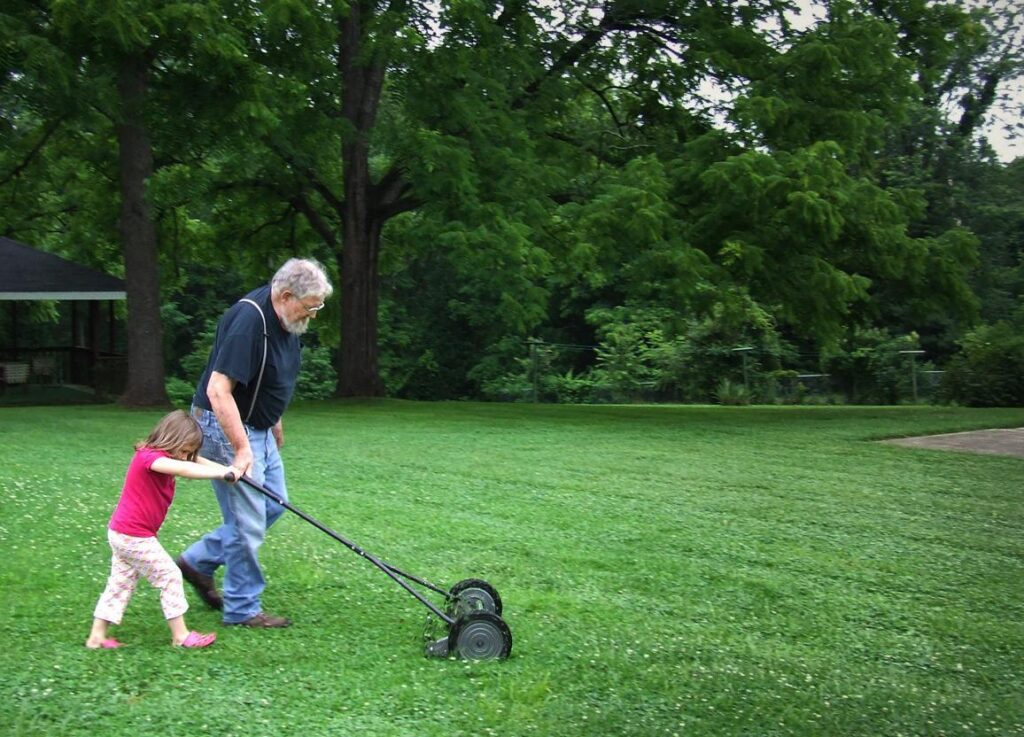
Clovers used to be an integral part of American lawns before synthetic fertilizers, and chemical herbicides came onto the market. They require less water, fertilizer, herbicide, and upkeep than grass lawns. This not only makes them easier and inexpensive to maintain but more eco-friendly as well.
However, clover lawns are not perfect, and they are certainly not for everyone. There are some significant disadvantages associated with having clovers on your lawn.
Keep reading to find out!
What Is a Clover Lawn?
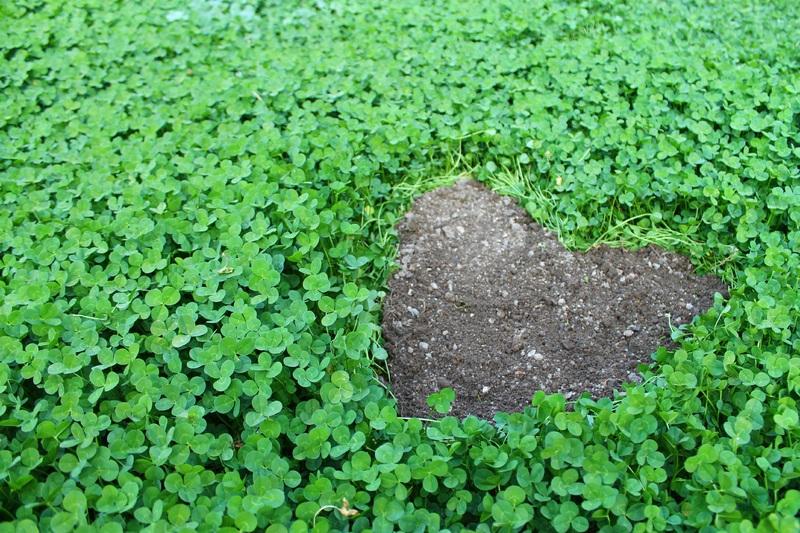
A clover lawn is either entirely made up of clovers or has both lawn grass and clovers as part of the ground cover. Clover lawns are characterized by the presence of small white flowers and broad leaves covering the ground just like grass.
However, unlike grass, clovers are leguminous plants. It means clovers can fix atmospheric nitrogen into the soil. The nitrogen is then used by the clovers themselves and also released to the nearby plants, which reduces fertilizer demands.
Moreover, once established, clover plants are quite drought-tolerant and typically don’t need frequent watering like grass lawns.
Grass Lawns Vs. Clover Lawns
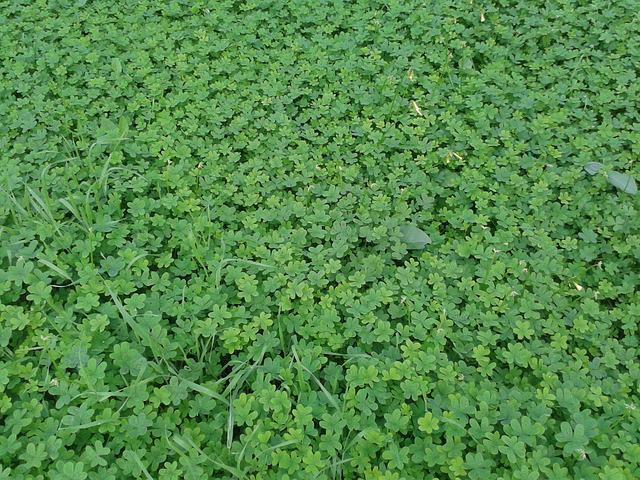
You can see a summary of some of the differences between a clover lawn and a lawn made entirely of grass in the table below.
| Grass Lawn | Clover Lawn |
|---|---|
| Made up of grass or a combination of different grasses | Made up entirely of clovers or a combination of clovers and grass |
| Requires regular maintenance such as consistent mowing and watering | Requires much less upkeep than typical grass lawns and needs to be watered and mowed less frequently |
| Requires regular fertilization | Can fix nitrogen, so fertilizer needs are much less |
| Highly prone to weeds | Excellent at choking out weeds itself |
| Will turn brown or go dormant out of season | Stays green longer than regular turfgrass lawns |
What Kind Of Clover Is Best For Lawns?
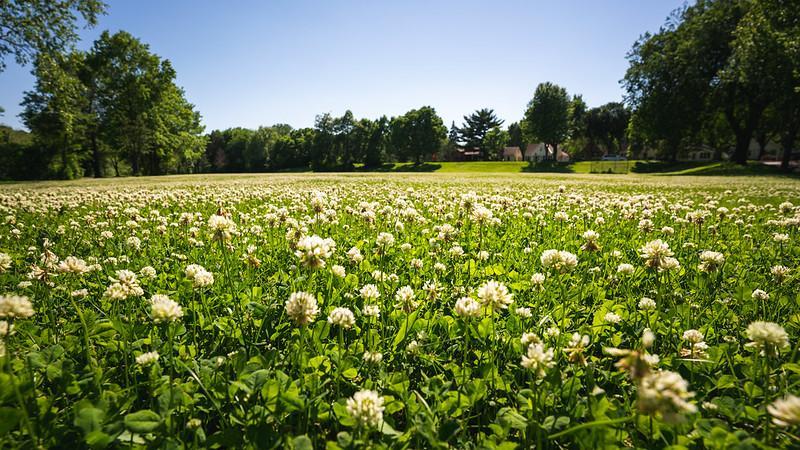
There are many types of clover that are used as grass substitutes for lawns, but Dutch white clover and micro clover are the two most popular choices. These two varieties of clover are described in detail below.
Micro clover
Micro clover is a term used to describe small varieties of clover with smaller leaves and fewer flowers than Dutch clover. Because they do not grow in clumps like larger species, micro clover lawns are superb for yards with high foot traffic.
You can read more about Micro clover here.
Dutch White Clover
Also known as dwarf white clover, Dutch white clover is characterized by the presence of tiny white flowers that, unlike grass, attract bees and other pollinating insects. Moreover, it remains green all year round. Also, white clover has one of the most robust root systems of any clover species, making it quite hardy.
You can read more about Dutch White Clover here.
Clover Lawns: Pros & Cons
Let’s now examine the advantages and disadvantages of having a clover lawn. As you can tell by the information presented above, there is no cut-and-dry answer to using clovers on a lawn.
There is, however, enough information available in this article to make an educated decision for yourself. So, let’s get started!
Advantages/Pros Of Clover Lawns
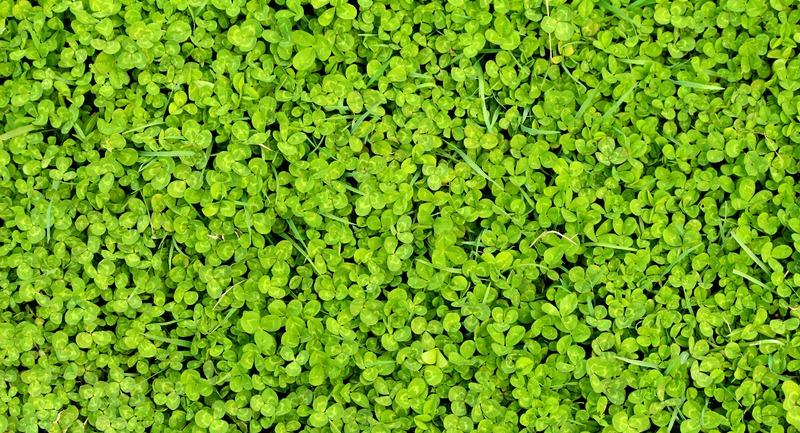
Clover Lawns Are Inexpensive
One of the main benefits of having a clover lawn is its low cost. It is excellent if you are on a budget, have bought a new home, want to make some upgrades to your yard, or simply do not have much money to afford a grass lawn. Clover seeds are inexpensive, and you plant an entire lawn with just a few bucks in your pocket.
Clover Lawns Require Less Water
As stated above, clovers develop a deep, robust and extensive root system that allows them to absorb water even in dry and hot conditions. It means you will not have to water your lawn as much, which saves on lawn care costs and is great for the environment.
Clover Lawns Stay Green Longer
As compared to regular turfgrasses, clover lawns remain greener for longer. In the north of the United States, clover lawns green up early in the spring and stay green till the first frost. While in the south, clover lawns sometimes stay green all year long unless it gets too hot.
Clover Lawns Require Little Mowing
Compared to regular grass lawns, which need to be mowed regularly to look tidied up and clean, clover lawns do much better without mowing. Even though they can grow two to eight inches tall, their growth is slow. SO, even if you decide to trim your clover lawn, you won’t have to do it as frequently.
Clover Lawns Are Pollinator Friendly
Unlike grass lawns, which offer few benefits for pollinator insects, clover lawns attract many species of insects and wasps. This not only makes clover lawns more eco-friendly, but the pollinator insects also keep many harmful lawn pests out.
Clover Lawns Are A Pleasure To Walk On
Lawn grass has sharp edges and is often quite sturdy. It will therefore feel as if something is nudging your feet when walking on a grass lawn. Contrarily, clover leaves have a considerably softer and lusher feel. It will feel like you are walking on a wool carpet.
Clovers Lawns Choke Out Weeds
The persistence of clovers can be confirmed by anyone who has attempted to eliminate them from a lawn. Its extensive root system allows it to outcompete other small plants. This may seem like an issue, but it is also a huge advantage when it comes to choking out weeds.
Clover Lawns Need Less Fertilizer
Clovers are leguminous plants. They can fix atmospheric nitrogen and fulfill their nitrogen needs on their own. Moreover, their extensive root network allows them to absorb nutrients from deeper into the soil. All this means you will need to fertilize your lawn less frequently.
Clover Lawns Don’t Need Herbicides
Do not use herbicides on clover laws. Clovers are broadleaf plants; unfortunately, most lawn herbicides are designed to kill small broadleaf plants. In addition, clovers are excellent at choking out weeds themselves, so herbicides won’t be needed anyway.
Clovers Lawns Can Grow In Poor Soils
Clover lawns are not very picky about where they grow. That is why they have been and are considered a weed. They can grow anywhere, despite whatever the growing conditions are. This makes them ideal for yards with substandard or less than perfect soil.
Clover Lawns Improve The Soil
As quoted earlier, clovers can fix atmospheric nitrogen. They use this nitrogen for themselves and make it available in the soil, which is great for surrounding plants. Also, by creating extensive root system clovers help relieve soil compaction issues.
Clover Lawns Are Immune To “Dog Patches”
If you have dogs, you must know they like relieving themselves in a specific spot on your lawn. Unfortunately, over time, the grass in that area can turn brown due to the dog’s urine. Clover lawns are immune to this problem, so you won’t have to worry about your yard looking ugly.
Disadvantages/Cons Of Clover Lawns
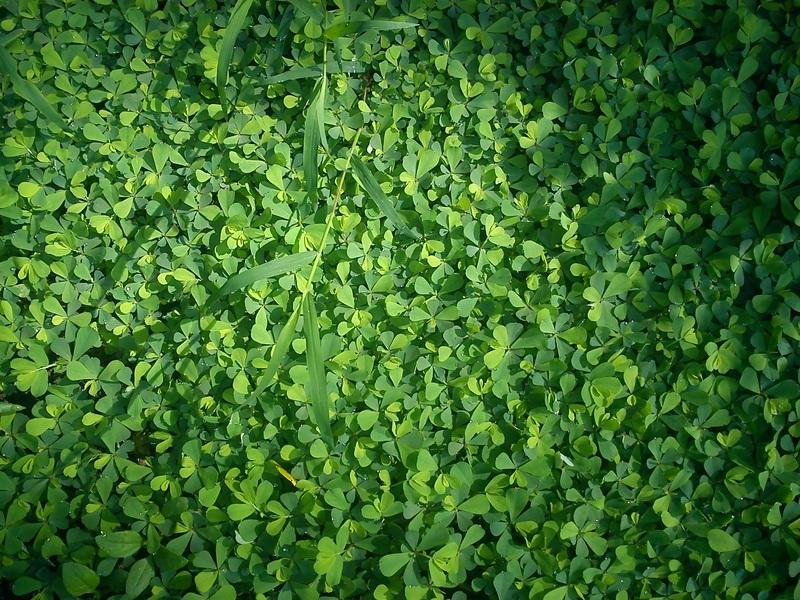
Now let’s discuss some of the disadvantages of having a clover lawn.
Clover Lawns Don’t Do Well In High Foot Traffic
Clover plants are soft and fragile. Unlike some turfgrass types, they are not ideal for turf areas and lawns with high activity.
So, you probably should stay away from a clover lawn if you arrange many outdoor gatherings. However, if your lawn has moderate activity, you can mix clover with a suitable grass, and your lawn will do just fine.
Clovers Lawns Attract Insects
Clover lawns are great for pollinators. However, maybe not for some people who don’t like having bugs around. Bees, wasps, and other pollinator insects visit clovers frequently to feed on their nectar. However, you can solve this issue by mowing your clover lawn when it is about to bloom.
Clover Lawns Stain Clothes
Even though staining is a significant issue with many grass lawns, the problem becomes much more severe when you have a clover lawn.
Clovers are soft and delicate plants. Their leaves break open easily, releasing their pigments and coloring your favorite clothes.
Clover Lawns Have A Short Life
Clover is a short-lived perennial. It only lives for about two to three years. That means that if you have a clover lawn, you will need to reseed it every two to three years, or it will get patchy. However, clover seeds are cheap, so overseeding should not be a problem.
Clover Lawns Are Not Very Aesthetic
Clover lawns might not be a good choice if you want a lawn with a uniform carpet-like appearance. Clovers have a bunch-like growth habit that does not look as aesthetic and as pleasing as a grass lawn. The issue is especially obvious in hybrid lawns where clovers are grown alongside grass.
RELATED: Is Having Micro Clover In Your Lawn Worth It? Pros & Cons Of Micro Clover In Grass!
Planting & Maintaining A Clover Lawn
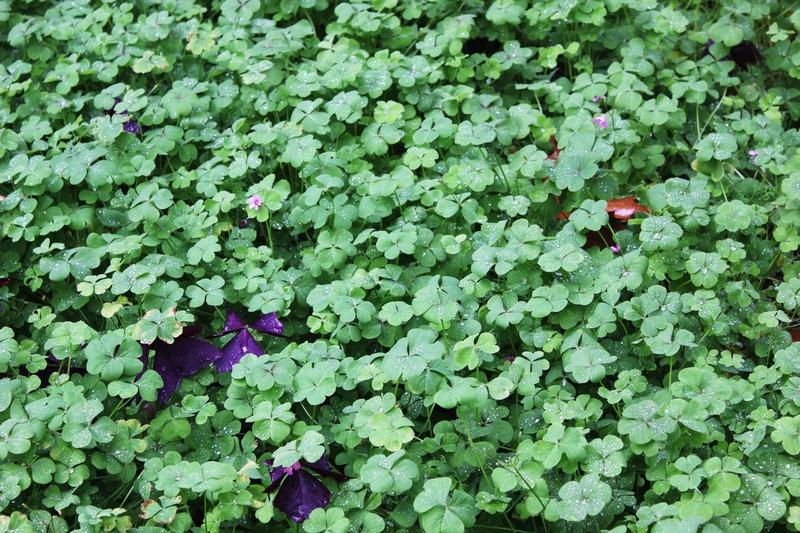
Compared to grass, clover needs to be maintained differently. Learning to maintain and care for a clover lawn properly is easy and worth it. Here is how to do it:
- Mid-March to mid-April is the best time to plant clover. However, clovers can also be planted in fall if you have missed this window.
- Tiny clover seeds are challenging to spread uniformly. One way to solve this issue is by combining the seed with sand, dirt, or sawdust.
- After sowing the seeds, sprinkle the soil with a misting attachment every day until you can see the seedlings emerging.
- Once established, most clovers grow slowly and don’t need much mowing unless you want to deter bees by preventing summer blossoms.
- Since cloves are a perennial with a short lifespan, they will need to be reseeded every two to three years to maintain good coverage.
- Clover lawns should never have herbicides applied to them.
Clover Lawns | Final Thoughts
Adding clover to the lawn is an excellent option for many homeowners if they do not mind a varied lawn appearance. However, understanding all of the clover’s benefits and drawbacks is crucial.
So, consider your needs and requirements and match them with the pros and cons of a clover lawn before deciding if you should plant clovers in your yard.
Frequently Asked Questions (FAQs)
Is clover good for your lawn?
Clovers can grow in poor soils where most grasses cannot; they have excellent tolerance against weeds and do not need to be mowed and watered frequently. However, clover lawns do not look as neat and clean as grass lawns and do not tolerate high foot traffic.
So, whether or not clover is a good choice for your lawn will depend on your preferences.
Do clovers attract bugs?
Planting clover in your yard will attract bugs, especially pollinator insects. However, it is not necessarily a bad thing. These pollinator insects are excellent at keeping out harmful lawn pests which is great for your lawn health.
Will clover choke out grass?
It’s a common misunderstanding that clovers will take over your lawn if you don’t control them. The truth is that clover won’t usually smother grass if the lawn is well-maintained. In fact, clovers can be quite beneficial for the grass in your yard.
What happens to the clover lawn in winter?
Since clover is a perennial plant, it will go dormant in the winters, just like many types of grass. However, compared to grasses, clover lawns are quicker to turn green in the spring. And clover lawns also stay greener for longer in the winters.
Do you need to mow clover?
White clover only grows 2–8 inches tall and requires little to no mowing to maintain its neat appearance. However, some homeowners might prefer to mow in the middle of the summer to keep the grass clean or stop it from flowering and attracting bugs.
Sources for Further Reading
Using clover as an eco-sustainable alternative to grass – Rutgers, The State University of New Jersey
Micro clover…A New Lawn Alternative – University of Illinois Extension Service
Lawns and Micro clover – University of Maryland Extension Service







